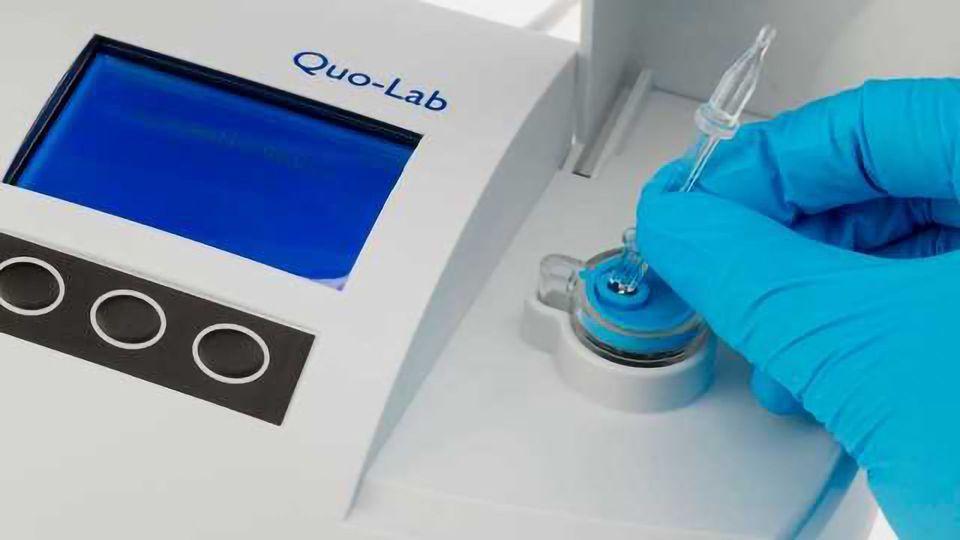EKF POC HbA1c Analyzer Demonstrates Excellent Performance in International Evaluation Study

EKF’s Quo-Lab POC HbA1c analyzer meets all international quality targets for diabetes testing
Want to listen to this article for FREE?
Complete the form below to unlock access to ALL audio articles.
Read time: 1 minute
EKF Diagnostics, the global in vitro diagnostics company, has announced the successful evaluation of its Quo-Lab® point-of-care HbA1c analyzer by the European Reference Laboratory for Glycohemoglobin. In a recently published paper [1], the reference laboratory’s evaluation study assessed HbA1c (glycated hemoglobin) POC devices using international quality targets, posing the question ‘Are they fit for purpose?’ Out of 30 available on the market and the four that agreed to participate, only EKF’s Quo-Lab and one other analyzer passed the same stringent quality criteria as laboratory analyzers, achieving excellent analytical performance.
The study aimed to evaluate the four POC HbA1c instruments according to Clinical and Laboratory Standards Institute (CLSI) protocols and how they performed when different criteria were applied using four certified IFCC and NGSP secondary reference measurement procedures (SRMPs). The reference laboratory study confirmed there was minimal bias between Quo-Lab and the mean of four SRMPs, it also passed all relevant performance criteria going far beyond what is required for NGSP and IFCC certification.
Notably, Quo-Lab showed no consistent clinically significant interference from the common hemoglobin (Hb) variants HbAS, HbAC, HbAD, HBAE and elevated A2. It also easily met imprecision criteria, achieving a ≤2.4% CV in IFCC SI units and ≤1.7% CV in DCCT units which represents a significant improvement on previous studies.
This evaluation success follows last year’s similarly excellent evaluation of EKF’s Quo-Test® HbA1c analyzer which was again confirmed to meet IFCC performance criteria [2]. Although not included in this latest study, Lenters-Westra felt it important enough to mention in the conclusion that the Quo-Test’s improved performance also had no bias compared to the mean of three SRMPs [1].
Commenting on the successful European Reference Laboratory for Glycohemoglobin evaluation, Gavin Jones, Diabetes Product Manager, EKF Diagnostics said, “The excellent performance that Quo-Lab has demonstrated in this latest study confirms that it is very definitely fit for purpose, delivering reliable HbA1c results in a range of settings. This study also highlights the performance improvements that we have made to both our Quo-Lab and Quo-Test HbA1c analyzers to fulfill increasingly tough requirements from the IFCC. This means that both analyzers meet the same rigorous quality criteria as laboratory analyzers.”
Quo-Lab® HbA1c is a desktop analyzer designed specifically to meet the needs of diabetes clinics and laboratories in settings that demand low cost of operation and ease of use. From a simple semi-automated procedure, Quo-Lab provides test results within four minutes from a venous or finger prick blood sample of just 4 μL. Quo-Lab uses the same boronate affinity methodology as Quo-Test which is also unaffected by Hb variants. Step-by-step instructions are displayed on a clear, multi-lingual display, therefore, staff training time is minimized and opportunity for error reduced. Quo-Lab is CE marked and available for sale in most global markets subject to local registration requirements.
References:
1) Lenters-Westra, E. & English, E. Evaluation of four HbA1c point-of-care devices using international quality targets: Are they fit for purpose? J Diabetes Sci Technol. 2018 Jul;12(4):762-770.
2) Lenters-Westra, E. & English, E. Understanding the use of sigma metrics in hemoglobin A1c analysis. Clin Lab Med 2017;37: 57-71.
The study aimed to evaluate the four POC HbA1c instruments according to Clinical and Laboratory Standards Institute (CLSI) protocols and how they performed when different criteria were applied using four certified IFCC and NGSP secondary reference measurement procedures (SRMPs). The reference laboratory study confirmed there was minimal bias between Quo-Lab and the mean of four SRMPs, it also passed all relevant performance criteria going far beyond what is required for NGSP and IFCC certification.
Notably, Quo-Lab showed no consistent clinically significant interference from the common hemoglobin (Hb) variants HbAS, HbAC, HbAD, HBAE and elevated A2. It also easily met imprecision criteria, achieving a ≤2.4% CV in IFCC SI units and ≤1.7% CV in DCCT units which represents a significant improvement on previous studies.
This evaluation success follows last year’s similarly excellent evaluation of EKF’s Quo-Test® HbA1c analyzer which was again confirmed to meet IFCC performance criteria [2]. Although not included in this latest study, Lenters-Westra felt it important enough to mention in the conclusion that the Quo-Test’s improved performance also had no bias compared to the mean of three SRMPs [1].
Commenting on the successful European Reference Laboratory for Glycohemoglobin evaluation, Gavin Jones, Diabetes Product Manager, EKF Diagnostics said, “The excellent performance that Quo-Lab has demonstrated in this latest study confirms that it is very definitely fit for purpose, delivering reliable HbA1c results in a range of settings. This study also highlights the performance improvements that we have made to both our Quo-Lab and Quo-Test HbA1c analyzers to fulfill increasingly tough requirements from the IFCC. This means that both analyzers meet the same rigorous quality criteria as laboratory analyzers.”
Quo-Lab® HbA1c is a desktop analyzer designed specifically to meet the needs of diabetes clinics and laboratories in settings that demand low cost of operation and ease of use. From a simple semi-automated procedure, Quo-Lab provides test results within four minutes from a venous or finger prick blood sample of just 4 μL. Quo-Lab uses the same boronate affinity methodology as Quo-Test which is also unaffected by Hb variants. Step-by-step instructions are displayed on a clear, multi-lingual display, therefore, staff training time is minimized and opportunity for error reduced. Quo-Lab is CE marked and available for sale in most global markets subject to local registration requirements.
References:
1) Lenters-Westra, E. & English, E. Evaluation of four HbA1c point-of-care devices using international quality targets: Are they fit for purpose? J Diabetes Sci Technol. 2018 Jul;12(4):762-770.
2) Lenters-Westra, E. & English, E. Understanding the use of sigma metrics in hemoglobin A1c analysis. Clin Lab Med 2017;37: 57-71.

